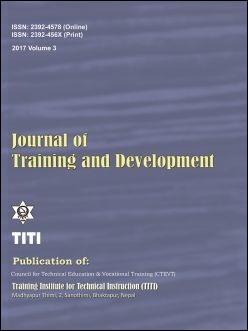Voyage from the Himalayas to the Highlands: Reflections in Technical Education
DOI:
https://doi.org/10.3126/jtd.v3i0.18231Keywords:
Ethnoscapes, credentialism, urbanism, technical education, UKAbstract
This paper reflects on my journey from the Nepal to the United Kingdom UK) as a student initially and then as a National Health Service (NHS) Grampian’s employee. The purpose of developing this paper was to draw insights on the factors that pulled me as an urban youth for studying andliving in the UK and to present the significance of skills-based technical education for the changing job market. I used analytic autoethnography to carry out this research, where I presented past epiphanies and consecutively interpreted the strong memories of those lived experiences and observations to broaden my theoretical understandings. I argued based on my lived experiences that the scope of the market based technical education is globally prevalent. For this, I have sequentially presented my stories of self-realizations and skills acquisition in the developed country such as the UK from the theoretical ideas of ethnoscapes, new and intelligent urbanism, and credentialism. Moreover, I have illuminated the relevance and significance of market based technical
education courses for competing not only in Nepal but also in the global job market of the UK through self-reflection. Findings in this paper suggest the need for the international students to be pre-equipped with market based skills and to opt for market oriented subjects preferably from the field of technical education.
Downloads
Download data is not yet available.
Abstract
2460
PDF
1026
Downloads
Published
2017-09-27
How to Cite
Bhurtel, A. (2017). Voyage from the Himalayas to the Highlands: Reflections in Technical Education. Journal of Training and Development, 3, 54–63. https://doi.org/10.3126/jtd.v3i0.18231
Issue
Section
Articles
License
Authors who publish with this journal agree to the following terms:
- Authors retain copyright and grant the journal right of first publication with the work simultaneously licensed under a Creative Commons Attribution License that allows others to share the work with an acknowledgement of the work's authorship and initial publication in this journal.
- Authors are able to enter into separate, additional contractual arrangements for the non-exclusive distribution of the journal's published version of the work (e.g., post it to an institutional repository or publish it in a book), with an acknowledgement of its initial publication in this journal.
- Authors are permitted and encouraged to post their work online (e.g., in institutional repositories or on their website) prior to and during the submission process, as it can lead to productive exchanges, as well as earlier and greater citation of published work (See The Effect of Open Access).




